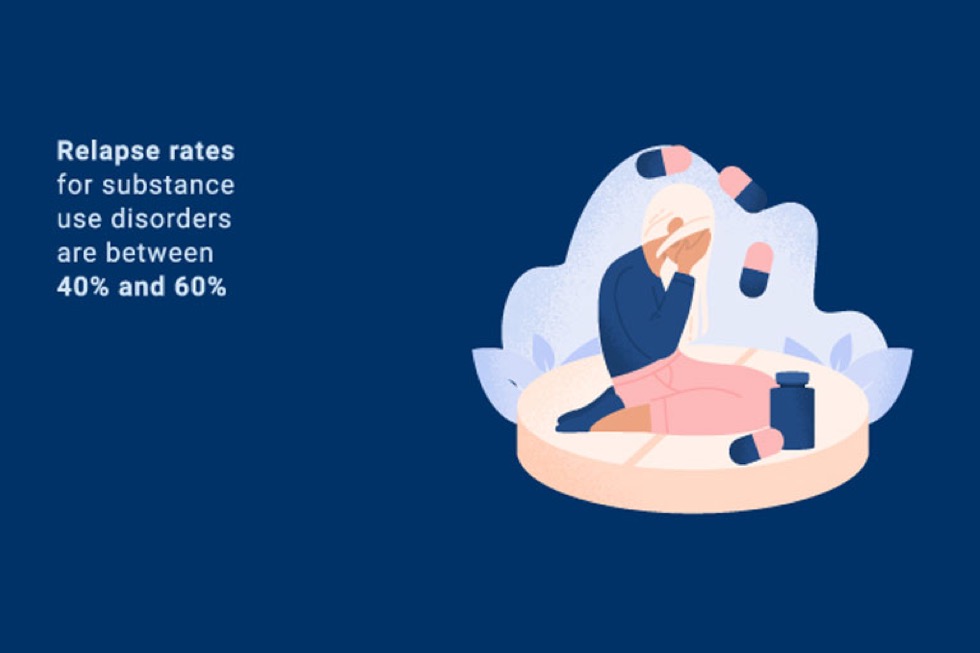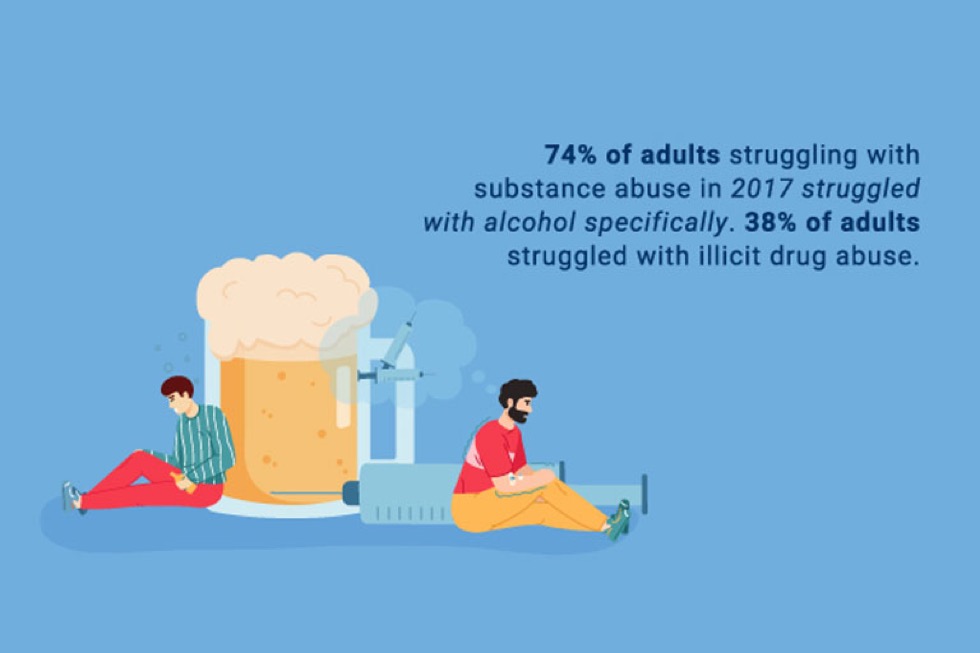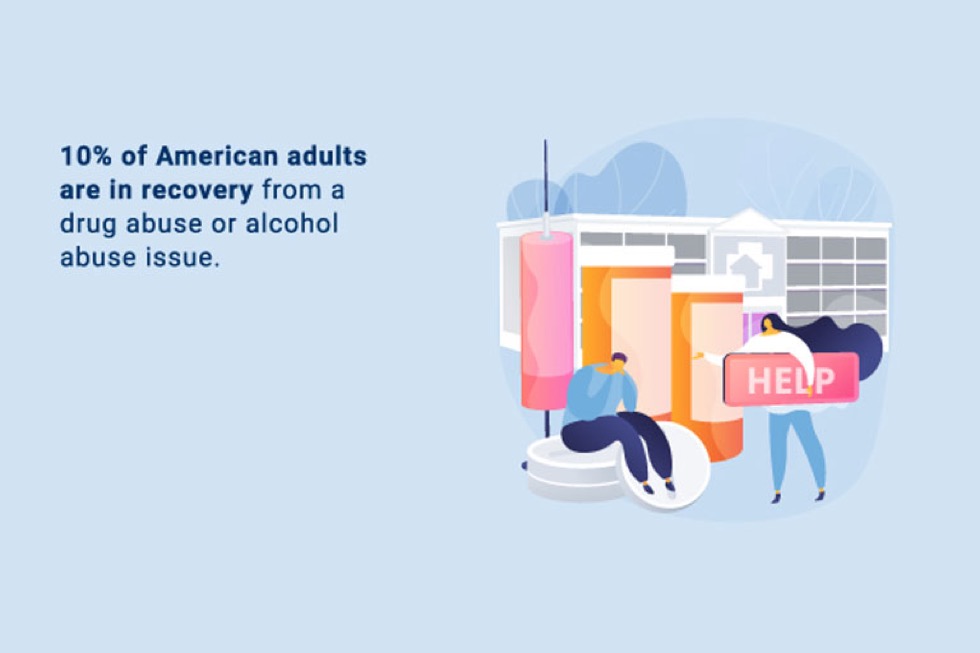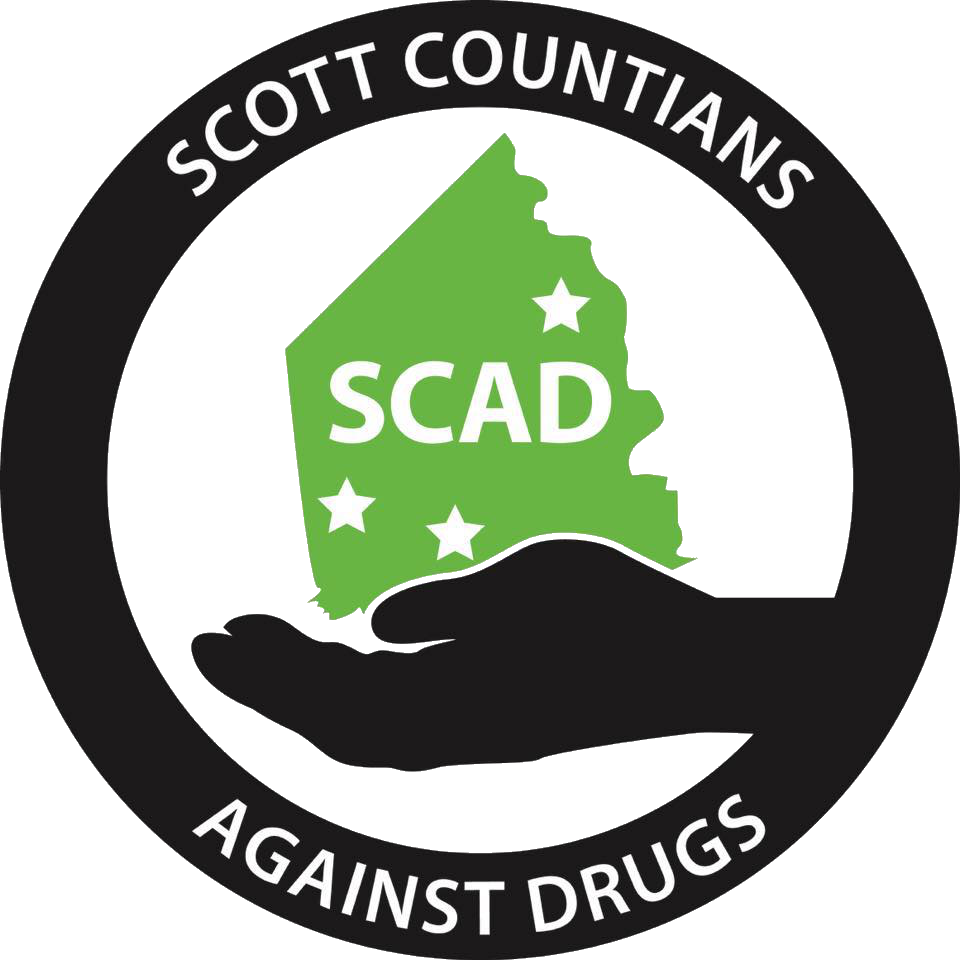Overview of Addiction Recovery
Drug addiction recovery is a process, not a single step. During that lifelong process, people recovering from addiction may experience the temptation to relapse or succumb to a drug relapse despite efforts to resist. A relapse is nothing to be ashamed of; however, it’s important to get back on the road to recovery quickly.
Furthermore, individuals recovering from substance use disorder and their family members should know drug relapse signs and triggers. Understanding these signs and triggers can help avoid relapses in the future.
Understanding Drug Addiction
What Is a Drug Relapse?
Drug relapse is both a process and an action outcome—it can include considering returning to substance abuse after already recovering from addiction or actively using the substance after attempting to stay sober.
Drug relapse is a core concern of the addiction treatment process, and preventing relapses is a primary objective of all aftercare treatment plans. For many, relapse is defined as one or more setbacks on the road to recovery.
How Common is Relapse?
Drug Relapse Does Not Mean Failure
If you or someone you know struggles with drug addiction, it’s important to understand that a relapse is not a failure to recover. Instead, relapsing is a temporary mistake or setback and is part of the recovery process. It’s always ideal to minimize relapses when possible. Nonetheless, if a relapse does occur, the most important thing is to get back on the road to recovery, never to think the recovery was a failure.
What Drug Has the Highest Relapse Rate?
Many drugs have high relapse rates among those who are addicted to them. For example:
Alcohol
Opiates
Cocaine
Heroin
Despite the high relapse rates, full recovery and lifelong sobriety are possible. As mentioned earlier, relapsing is just a bump in the road to recovery.

Drug Relapse Stages
Drug relapses do not occur suddenly or randomly. Instead, it’s better to understand drug relapsing as a complex and progressive process. A given drug relapse typically progresses through three stages—the emotional stage, the mental stage, and the physical stage.
Understanding these stages provides a better opportunity to prepare for prevention, relapse, and intervention as needed.
Emotional Relapse
The emotional relapse stage often occurs without realizing it. So, the individual suffering from substance abuse disorder does not think about using the substance. However, people recovering may recall when they relapsed for the first time or some other incident when they did not meet their personal expectations.
Negative behavior and emotions can set the stage for a potential relapse incident. In the emotional stage, denial is a major negative force that can prevent people from understanding the threat of relapse until it is too late.
Mental Relapse
The mental relapse stage occurs after individuals with substance abuse disorder experience emotional relapse for an extended amount of time, such as several days or weeks. This stage is frequently met by poor self-care or hygienic behaviors.
The at-risk individuals feel increasingly unpleasant with themselves and other people. They may experience discontent, restlessness, and irritability. This causes negative emotions to build up, leading to tension. That tension then causes them to think about using the substance again to escape the uncomfortable feelings.
A Further Look
The mental relapse stage is an internal war within the mind—one side wants to eliminate negative feelings by using alcohol or drugs, and the other side does not want to relapse. Resisting the urge to relapse becomes much more difficult at this stage. As a result, some sufferers may retreat into a deeply isolated or obsessive state of mind.
Physical Relapse
The physical relapse stage is when people start to use drugs or alcohol again, breaking their sobriety. Depending on the person and their treatment plan, a relapse only fully occurs when substance use becomes uncontrollable. However, most clinics and treatment programs consider the first use of drugs or alcohol a physical relapse.
The former point of view can be very dangerous—believing a relapse is official only when drug or alcohol use is uncontrollable. This line of thinking can cause individuals to distract or lie to themselves by only using “sparingly,” setting themselves up for consequences down the road. Thus, it’s best to consider any use of drugs or alcohol while in a treatment program to be a relapse.
A Further Look
The physical relapse stage can persist for days, weeks, or much longer. In some cases, physical relapses can erase progress made during recovery and lead to serious mental and physical side effects or dangers. Nevertheless, a physical relapse does not mean the end of treatment or recovery. It just means that returning to a treatment program is needed.

Drug Relapse Stages
Drug Relapse Signs and Symptoms
Drug relapsing can happen to anyone, but there are notable signs and symptoms to watch out for. By understanding and anticipating these signs, people can better avoid relapsing and limit the probability of a relapse occurring.
Early Indicators of Relapse
Emotional Signs of Drug Relapse
Several signs might be present in the emotional stage of a drug relapse. These signs are frequently behavioral, though they can also be personally expressed. Those at risk of relapsing might notice these emotional signs within their own feelings. The emotional signs of drug relapse include:
- Isolation from others, including perceived isolation (which can be just as real, even if it isn’t “true” in an objective sense)
- Attending meetings or meeting family members without sharing or engaging feelings
- Emphasizing or focusing on other people’s problems to the exclusion of their own
- Suppressing or ignoring emotions
- Problems with eating or sleeping properly
- Not attending support meetings or group therapy sessions, even when required
- Reduction in physical self-care
Mental Signs of Drug Relapse
The mental stage of relapse has several signs and symptoms to watch out for. These include:
- Craving drugs or alcohol
- Lying, cheating, or bargaining to get substances
- Minimizing past mistakes, consequences, or incidents that occurred when using drugs or alcohol
- Reminiscing about past incidents of using drugs or alcohol
- Planning ways to relapse while minimizing consequences
- Actively seeking ways to use
- Bargaining with or lying to themselves to make it seem as though drug or alcohol use is under control
Physical Signs of Drug Relapse
The physical signs of a drug relapse are typically easier to spot than the signs of the other relapse stages. They include:
- Using drugs or alcohol once again when they were previously sober
- Struggling to get to work on time or meet social appointments
- Becoming more isolated or only spending time with others who abuse drugs
Signs Indicating a Relapse Is Close
If someone is potentially in the midst of a relapse, look for the following signs and symptoms:
- Difficulty breathing
- Difficulty controlling their emotions or behavior
- Mood swings or irrational behavior
- Conspiracy theories or paranoia
- Sweating
- Shaking
- Vomiting
If the signs or symptoms become serious, we highly recommend contacting a medical professional or treatment facility. A medical detox program may be necessary before further recovery steps can be taken.

Common Drug Relapse Triggers
Relapse is more likely to occur when surrounded by common drug relapse triggers. Here’s a breakdown of the most common drug relapse triggers so that people can avoid or eliminate them from their homes for a healthier and more stable recovery process:
Verbal Triggers
Verbal triggers can be sneaky and difficult to stop. They can include anything from discussing drugs or alcohol to hearing the name of specific drug or alcohol brands or products. Even conversations about substance abuse can cause the temptation to relapse.
This is one reason why individuals recovering from substance use disorder should spend time with others who are recovering or with sober individuals. Spending time with people who like to talk about drugs may make resisting the urge to relapse very difficult.
Physical Triggers
Physical triggers involve performing the same motions or actions the mind subconsciously associates with using drugs. For example, going to a restaurant and drinking from a cup that could contain alcohol could be a physical trigger.
People recovering from substance use disorder should avoid physical triggers at all costs because they may inspire them to continue the physical motions of substance abuse, even if they don’t consume any substances. That, in turn, may increase one’s chances of relapsing.
Behavioral Triggers
Behavioral triggers are a set of behaviors a person would engage in that involve using or abusing a substance. For example, if someone previously drank alcohol after coming home from work, the mere act of coming home after a day at the workplace and sitting down at the same place on the couch can increase the desire for alcohol.
Behavioral triggers can also be associated with other individuals, conversation styles, and more.
Environmental Triggers
Environmental triggers are any triggers related to one’s environment. For example, having beer bottles lying around can be damaging and dangerous for someone recovering from alcohol use disorder. The beer bottles serve as constant reminders of their addiction, making the odds of relapsing much higher.
Triggers can come from anywhere at any time. Thus, many aftercare treatment programs and drug treatment sequences focus on creating safe, trigger-free spaces. Adhering to a recovery plan should be much easier without any possible triggers.

Common Drug Relapse Triggers
Drug Relapse Prevention Plan
Many drug relapse prevention plans will include key practices and strategies to minimize relapse chances or trigger factors.
Aftercare Treatment
Aftercare treatment programs help those recovering build good habits and strong foundational routines, so they’re at a lower risk of relapsing. Aftercare treatment can include regular therapy, inpatient or outpatient programs, and regular group meetings with other people in the same position.
Lifestyle Changes
Major lifestyle changes may be necessary to reduce the likelihood of a drug relapse. These can include:
- Not spending time or socializing with other drug abusers
- Changing one’s environment by moving out of a stressful place
- Changing one’s job to minimize daily stressors
- Adding healthy habits like exercise to one’s daily routine
Identifying and Avoiding Triggers
Above all else, drug relapse prevention plans focus on identifying and avoiding potential relapse triggers. By avoiding triggers from cropping up in the first place, people recovering will have a much easier time maintaining sobriety and sticking to their aftercare plans.
12-Step Program
Many drug relapse prevention plans have 12-Step programs. These supportive programs offer social networks and provide a structured approach to recovery, starting from acceptance to helping others recover.
Many 12-Step programs are connected to specific clinics or treatment centers. In addition, many are heavily based on faith or religion, which acts as shared social fabrics that bind group members together in a positive way.
Building a Strong Support System
Lastly, drug relapse prevention plans should include steps to build a strong support system with loved ones, such as friends and family members. A strong support system enables people in recovery to withstand the temptations of relapsing or find quick assistance if they know they are in danger of succumbing to those temptations.
For example, a strong support system might include a single family member on speed dial who a person recovering can call at any point to get a ride to a hospital or clinic if they become triggered. Having a strong support system also means surrounding oneself with positive and supportive people and cutting out toxic or harmful people if needed.

Treatment for Drug Addiction and Relapse at San Diego Detox
Drug relapsing is part of the long and complex road to recovery, and it’s not something anyone should face alone. San Diego Detox has a variety of drug and alcohol addiction treatment options to minimize the likelihood of relapsing.
Detox
We offer drug and alcohol detox programs to help clients cleanse their bodies of substances and restore them to a state of holistic wellness.
Inpatient Programs
Inpatient addiction treatment programs can help people get back on their feet and learn positive, healthy structural habits. This involves clients staying at our facility for the duration of their treatment to focus on recovery in a safe environment.
Outpatient Programs
Outpatient treatment programs can serve clients well if they need to continue work or handle other responsibilities. Outpatient programs provide structure, management, group meetings, and more to make managing relapse risk easier.
Sober Living Programs
Sober living programs allow clients to reside in a communal home with others recovering from substance use disorder. This provides the opportunity for everyone to support each other and recover in a trigger-free environment.
Inside Look at Sober Living Programs
Opportunities for Treatment at San Diego Detox
Ultimately, there are many ways to get the help needed for a successful recovery. Contact San Diego Detox today to learn more and begin the road to a substance-free and healthy life!
Resources
- 1https://www.ncbi.nlm.nih.gov/pmc/articles/PMC3674771/#R2
- 2https://pubs.niaaa.nih.gov/publications/aa06.htm
- 3https://www.lenus.ie/bitstream/handle/10147/110022/Article5260.pdf
- 4https://pubmed.ncbi.nlm.nih.gov/10359464/
- 5https://pubmed.ncbi.nlm.nih.gov/20669601/
- 6https://nida.nih.gov/publications/drugs-brains-behavior-science-addiction/treatment-recovery
- 7https://nida.nih.gov/publications/drugs-brains-behavior-science-addiction/drug-misuse-addiction
- 8https://www.samhsa.gov/data/report/2017-nsduh-annual-national-report
- 9https://drugfree.org/newsroom/news-item/survey-ten-percent-of-american-adults-report-being-in-recovery-from-substance-abuse-or-addiction/
